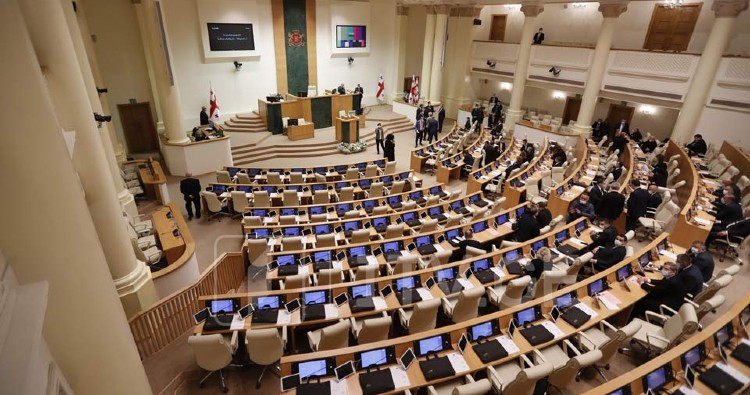Georgian Parliament discusses transparency bill at plenary session

The domestic opposition objected to the decision to hold the plenary hearing on the bill today instead of Thursday, and gathered in front of the Parliament building along with members of the public, representatives of the non-governmental organisations and students to protest the bill. Photo via 1TV.ge
The Georgian Parliament on Tuesday continued discussions of the proposed bill that involves registration of non-commercial legal entities and media outlets in the country as “agents of foreign influence” if they derive more than 20 percent of their income from abroad, local media said.
At a plenary session of the lawmaking body, the discussion saw more confrontation among legislators following clashes that accompanied hearings last week. The hearings also involve members of the United National Movement opposition party, who have been boycotting Parliamentary work.
The domestic opposition objected to the decision to hold the plenary hearing on the bill today instead of Thursday, and gathered in front of the Parliament building along with members of the public, representatives of the non-governmental organisations and students to protest the bill.
 Photo via IPN
Photo via IPN
Interior Ministry urged the protesters not to exceed the limits of freedom of expression and assembly and also, warned the organisers and participants of the rally not to allow calls for violence and ensure that the rally not to become violent, adding the officers of the Ministry would apply “all appropriate measures” to ensure public order and security.
The legislative piece was supported at the first hearing by the Foreign Relations and Defence Committees last week.
The backlash and public protests against the proposed draft law have seen it being labelled “incompatible with the basic principles of a modern democratic state” by the domestic opposition, civil sector and diplomatic representations in the country.
The United Nations Office in Georgia has criticised its potential adoption by saying it would “risk impeding the work of civil society and media and the essential contributions they make to Georgian democracy”.
 Tweet
Tweet  Share
Share